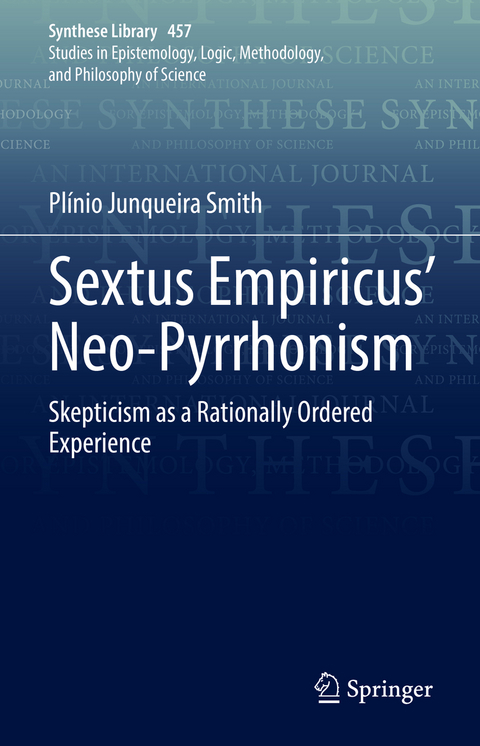
Sextus Empiricus’ Neo-Pyrrhonism
Springer International Publishing (Verlag)
978-3-030-94517-6 (ISBN)
This book offers a comprehensive interpretation of Sextus Empiricus based on his own view of what he calls the distinctive character of skepticism. It focuses on basic topics highlighted by this ancient philosopher concerning Pyrrhonism, a kind of skepticism named for Pyrrho: its concept, its principles, its reason, its criteria, its goals.
In the first part, the author traces distinct phases in the life and philosophical development of a talented person, from the pre-philosophical phase where philosophy was perceived as the solution to life's disturbing anomalies, through his initial philosophical investigation in order to find truth where the basic experience is that of a huge disagreement between philosophers, to the final phase where he finally recognises that his experience is similar to that of the skeptical school and adheres to skepticism.
The second part is devoted to explain the nature of his skepticism. It presents an original interpretation, for it claims that the central role in Sextus' Neo-Pyrrhonism is played by a skeptical logos, a rationale or way of reasoning. This is what unifies and articulates the skeptical orientation. The skeptic goes on investigating truth, but in a new condition, for he is now tranquil, and he has a skeptical method of his own. He has also acquired a special ability in order to balance both sides of an opposition, which involves a number of different skills. Finally, the author examines the skeptical life generated by this philosophical experience where he lives a life without opinions and dogmas; it is an engaged life, deeply concerned with our everyday actions and values.
Readers will gain a deeper insight into the philosophy of Pyrrhonism as presented by Sextus Empiricus, as well as understand the meaning of anomalía, zétesis, epokhé, ataraxía, and other important ideas of this philosophy.
lt;p>
Plínio Junqueira Smith is professor of History of Modern Philosophy and Theory of Knowledge at Universidade Federal de São Paulo (Brazil). He has published many books on the history of scepticism, as well as many papers on scepticism, history of modern philosophy, and analytical theory of knowledge (both in international journals and collective works), including Scepticism in the Eighteenth Century: Enlightenment, Lumières, Aufklarüng, Dordrecht, Springer, 2013, Academic Scepticism in Early Modern Philosopophy, Dordrecht, Springer, 2017 (both with Sébastien Charles), and Sceptical Doubt and Disbelief in Modern European Thought, Dordrecht, Springer, 2020 (with Vicente Raga-Rosaleny).
Preface.- Chapter 1. Ton charactêra tês skepseôs: The Distinctive Character of Skepticism.- PART I: Tên elpida tou ataraktêsein: The Road to Skepticism.- Chapter 2. Megalophueis and anômalia: The talented person, conflicts in everyday life, and the attraction of philosophy.- Chapter 3. Zêtêsis I: The initial investigation of the philosophos.- Chapter 4. Hai anôtatô philosophiai: The results of philosophical investigation.- PART II: Hê skeptikê agôgê: The Skeptical Orientation.- A. Hairesis: Doctrine.- Chapter 5. Ti logos: The skeptical way of reasoning.- B. Zêtêsis II: Continued investigation.- Chapter 6. Malista archê and zêtêtike agogê: The skeptic as the guardian of investigation.- Chapter 7. Ennoia and dunamis antitetike: The plasticity of the skeptic's ability.- Chapter 8. Sunagomen eukotôs hoti ephekhomen: The rational ability to suspend judgment.- C. Bios: Life.- Chapter 9. Ton seirenon huposkhesin: The dogmatic attack on everyday life.- Chapter 10. Kriterion I: phainomenon:Living in the natural and social world.- Chapter 11. Kriterion II: alêtheia: Living with belief and knowledge.- Chapter 12. Ataraxia and metriopatheia: The engaged life of a Pyrrhonist.- Index.
"Smith's book is a tour de force of systematically cataloging all of the major misinterpretations and patiently laying out how to properly interpret Sextus Empiricus. ... For an academic book, it is written in a straightforward style ... . For people interested in the modern practice of Pyrrhonism, or any form of neoskepticism in general, Smith's book is a much-needed antidote to the common misinterpretations promulgated by scholars who neither practice Pyrrhonism nor who are inclined to analyze it sympathetically." (pyrrhonism.medium.com, April 1, 2022)
“Smith’s book is a tour de force of systematically cataloging all of the major misinterpretations and patiently laying out how to properly interpret Sextus Empiricus. … For an academic book, it is written in a straightforward style … . For people interested in the modern practice of Pyrrhonism, or any form of neoskepticism in general, Smith’s book is a much-needed antidote to the common misinterpretations promulgated by scholars who neither practice Pyrrhonism nor who are inclined to analyze it sympathetically.” (pyrrhonism.medium.com, April 1, 2022)
| Erscheinungsdatum | 03.03.2022 |
|---|---|
| Reihe/Serie | Synthese Library |
| Zusatzinfo | XVI, 372 p. 1 illus. |
| Verlagsort | Cham |
| Sprache | englisch |
| Maße | 155 x 235 mm |
| Gewicht | 722 g |
| Themenwelt | Geisteswissenschaften ► Philosophie ► Allgemeines / Lexika |
| Geisteswissenschaften ► Philosophie ► Geschichte der Philosophie | |
| Geisteswissenschaften ► Philosophie ► Philosophie der Neuzeit | |
| Schlagworte | Agrippa's Trilemma • Agrippa’s Trilemma • Ancient Philosophy • Disagreement • Dogmatism • phenomenon • Pyrrhonism • Sceptical Modes • Scepticism • Sextus Empiricus • Suspension of Judgement |
| ISBN-10 | 3-030-94517-0 / 3030945170 |
| ISBN-13 | 978-3-030-94517-6 / 9783030945176 |
| Zustand | Neuware |
| Informationen gemäß Produktsicherheitsverordnung (GPSR) | |
| Haben Sie eine Frage zum Produkt? |
aus dem Bereich


